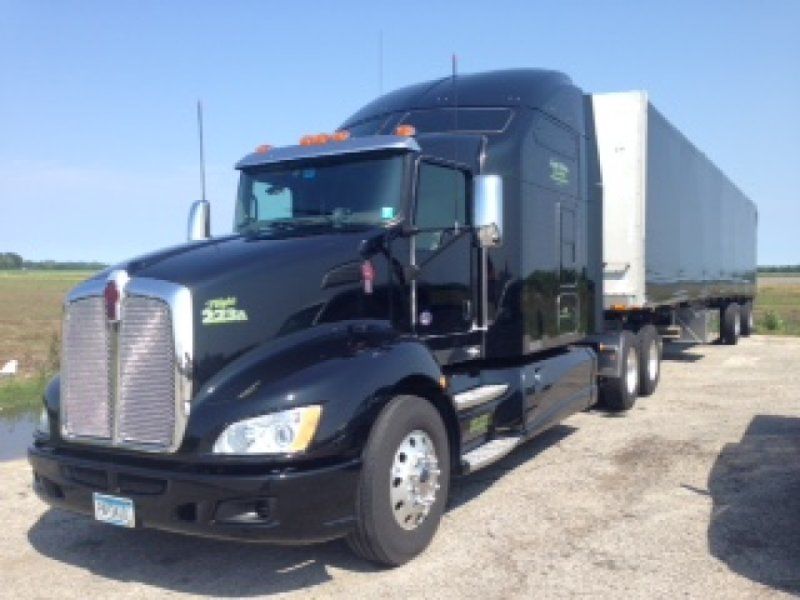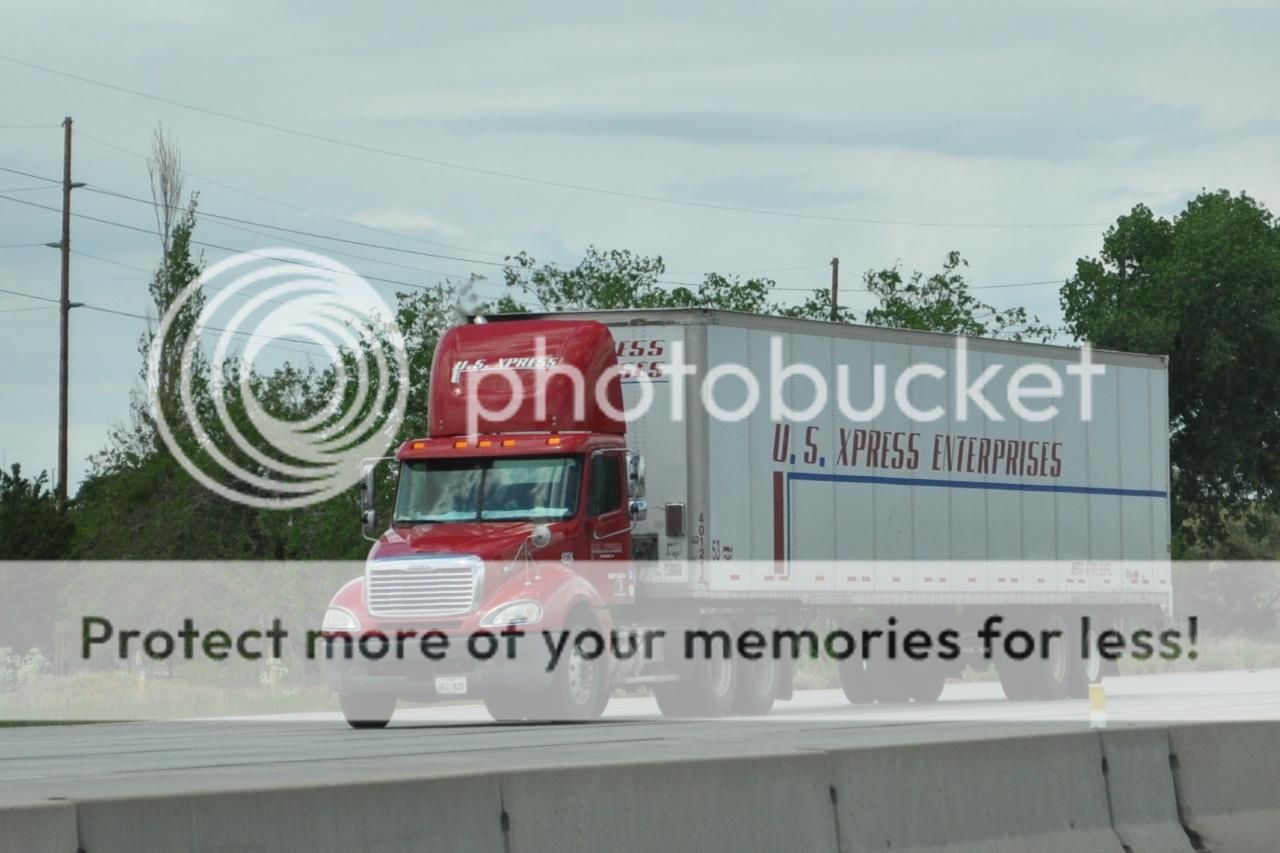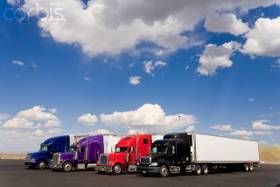Fuel Stops
Topic 2950 | Page 1

It's my understanding that the large trucking companies will negotiate their fuel purchases with the major fuel companies. (Flyin J/Pilot, TA/Petro, and Love's) The price on the pump is not the final price that the company will actually pay. Quantities and price are negotiated months in advance.
With Knight, I will get fueling instructions to one of these three companies and I am required to top off tanks when I am at one of Knight's terminals. How they determine which one they will use and how much fuel to get at the stop is still a mystery to me. Occasionally, I will be required to purchase 50-75 gallons at one stop, then fill at the next stop.
I usually avoid terminals. Seems when you get to one it is hard to get away and the drivers that hangout there are not my type. And, you get shower credits and can accumulate reward points for fueling at the truck stops. No such bennies at the terminal.
Terminal:
A facility where trucking companies operate out of, or their "home base" if you will. A lot of major companies have multiple terminals around the country which usually consist of the main office building, a drop lot for trailers, and sometimes a repair shop and wash facilities.

The larger companies definitely negotiate price months in advance with Love's, Pilot, TA, etc. Just like the airline industry they buy XXX thousand gallons based on some analyst on Wall Street saying the price will go up or down. Not sure if they pay upfront for it or if they have an "option" type contract saying they have the option to buy it at X price up to Y gallons.
At Schneider Bulk I could fuel at Love's and Pilot/Flying J whenever I wanted. There were no pre-planned fuel stops. Same with US Xpress, although I am on a Dedicated Account so I don't know if OTR drivers have pre-planned fuel stops.
I think pre-planning fuel stops for drivers is either a way for the company to control cash flow or just baby-sit drivers. For every gallon sitting in your tank that is a dollar not in the company account. I would hate to be told where and when to fuel, same with routing, I think that part of your job as a driver is to figure out how to get to the destination and where you should fuel as well as where you should sleep and take breaks.
OTR:
Over The Road
OTR driving normally means you'll be hauling freight to various customers throughout your company's hauling region. It often entails being gone from home for two to three weeks at a time.
Steven, the company I work for is adamant that we use the planned fuel stops they give us. Just like Sandman said, I will sometimes get a goofy fuel stop that tells me to get thirty gallons and then my next fuel stop will tell me to fill up. At first I thought this is so silly, why can't I just go ahead and fill up at the first stop and not have to waste this extra time? It turns out that the way they negotiate their fuel price is that they get so many cents off the price that is posted at what ever particular store they are making the purchase at.
So, let's say they have negotiated to get forty two cents off the price of each gallon of fuel. Well, I'm in Connecticut where the price of fuel is ridiculous, but I'm down to a quarter of a tank and I'm headed to Wisconsin - they will have me get a small amount of fuel in Connecticut so that I can get over into Pennsylvania where the fuel is much cheaper and then they will have me fill up. We fuel exclusively at Flying J's and Pilot's because that is where we have the negotiated deals going on. Even though we use those stores exclusively there are still considerable price fluctuations between stores. So the Driver Managers keep up with the prices at each store and try to get our fuel stops at the least expensive stores on any given day.
I know this kind of sounds like they are being anal about this fuel thing, but the fuel expenses that these large carriers have are astronomical. Any way they can chip away at it is taken advantage of. Just to give you an idea about what they are spending, we recently got a qualcomm message stating that because of the unusually cold winter weather we were having this year the fuel department had calculated that by the end of February they had spent an additional $646,000.00 over the previous year just idling the trucks so that drivers could stay warm! They weren't complaining, they just wanted us to be aware of the costs and therefore to try and be conservative where ever we could. We have about 2,600 trucks on the road, but there are some carriers who have maybe 12 or 15 thousand trucks out there. It is simply a way to try and control their expenses in an economy where the rates for moving freight are just about as low as they can go and remaining flat all across the spectrum. When you can't make money with the rates you charge you have to try and make a difference somewhere else, and for most of these carriers it is in trying to reign in their expenses wherever it is possible.
Qualcomm:
Omnitracs (a.k.a. Qualcomm) is a satellite-based messaging system with built-in GPS capabilities built by Qualcomm. It has a small computer screen and keyboard and is tied into the truck’s computer. It allows trucking companies to track where the driver is at, monitor the truck, and send and receive messages with the driver – similar to email.Dm:
Dispatcher, Fleet Manager, Driver Manager
The primary person a driver communicates with at his/her company. A dispatcher can play many roles, depending on the company's structure. Dispatchers may assign freight, file requests for home time, relay messages between the driver and management, inform customer service of any delays, change appointment times, and report information to the load planners.Driver Manager:
Dispatcher, Fleet Manager, Driver Manager
The primary person a driver communicates with at his/her company. A dispatcher can play many roles, depending on the company's structure. Dispatchers may assign freight, file requests for home time, relay messages between the driver and management, inform customer service of any delays, change appointment times, and report information to the load planners.HOS:
Hours Of Service
HOS refers to the logbook hours of service regulations.
In addition to the cost factor, doesn't it also help knowing how much weight you have in fuel when planning the next load ?
OWI:
Operating While Intoxicated
Most of the major carriers require you follow their fuel stops. Most major carriers don't have the dispatchers sending out the fuel stops. It's a computer program that does all the calculations itself and sends you the best fuel stops to save the company the most money.
Dispatcher:
Dispatcher, Fleet Manager, Driver Manager
The primary person a driver communicates with at his/her company. A dispatcher can play many roles, depending on the company's structure. Dispatchers may assign freight, file requests for home time, relay messages between the driver and management, inform customer service of any delays, change appointment times, and report information to the load planners.This is a good question a lot of folks probably would not even think of. All the replies are spot on. When we get fuel we send in a message on the computer how much we have. Either full, or how many 1/8's of a tank. The computer does the rest. I'm running dedicated on the east coast so I fuel mostly in South Carolina because the taxes are way cheaper. But never buy tobacco products there. They are out of sight....

Well...the price of fuel is one consideration....but theres another one that the driver wouldn't even think about, unless you are a lease or O/O truck. FUEL TAX..When you go into a state, you write your mileage down,.then you cross the scales going into a state, you are tagged...even if you don't go thru the scale, they get your info from cameras, etc. THEN, when you go out of the state, you write your mileage down. ( do you put that info on your qualcom ??  I was never a company driver...)In order to "break even" with the state fuel tax chart, you should buy enough fuel to pay for you to roll on their roads. If you buy to much fuel in one state, the suplus fuel tax paid, will be moved over onto another state when they calculate the fuel taxes for that truck. In Oregon, you pay Ton Mile Tax, and no fuel tax...I think its currently 17.3 cents per mile to roll across Oregon. BUT...their fuel is cheaper than surrounding states, but theres no benefit other than that. So if you fuel in WA, and buy more than what pays your rolling tax, the extra will be moved over onto the taxes you would pay in ID, and/or MT...Having been an O/O..we calculated those fuel taxes as close as we could..I'm not sure that companies even bother with it, since they get such slammin' deals on bulk fuel....
I was never a company driver...)In order to "break even" with the state fuel tax chart, you should buy enough fuel to pay for you to roll on their roads. If you buy to much fuel in one state, the suplus fuel tax paid, will be moved over onto another state when they calculate the fuel taxes for that truck. In Oregon, you pay Ton Mile Tax, and no fuel tax...I think its currently 17.3 cents per mile to roll across Oregon. BUT...their fuel is cheaper than surrounding states, but theres no benefit other than that. So if you fuel in WA, and buy more than what pays your rolling tax, the extra will be moved over onto the taxes you would pay in ID, and/or MT...Having been an O/O..we calculated those fuel taxes as close as we could..I'm not sure that companies even bother with it, since they get such slammin' deals on bulk fuel....
HOS:
Hours Of Service
HOS refers to the logbook hours of service regulations.
I want to say two things....
1) you would think it's common sense to get fuel when you are getting low or can only carry a certain amount due to load weight but guess what? Drivers out here run out of fuel everyday. Why? Not sure. They forgot maybe or was not paying attention to the fuel they had used or whatever excuse they want to use to cover up them not doing their job. So to combat the expense of a road call or service call the company tells drivers where and when to fuel cause some drivers can't do it themselves.
2) My truck is not on a fuel optimizer program. A lot of Werner trucks are due to the accounts that are under contract but also goes back to #1. I have a fuel book with all the available fuel stops in every state and I choose the ones I want depending on where my route takes me. Thankfully I get to get as much fuel as I need when I need it. I have to keep full fuel tank when I can. There have been times where the closest fuel stop was 300 miles away. Now that's not to say there were not closer places to get fuel but depending on my pre load I may run 150 miles to a customer and the back haul will be along the same route going the other way which would be 300 miles total. Though I have 200 gallons on board ,100 gallon duel tanks, I try to fuel up every 50 gallons or 300 miles. After 4.5 to 5 hours I am ready for a break. Though there has been times where I have went as much as 1200 miles between fuel stops due to the cold weather and truck stops being frozen.
OOS:
When a violation by either a driver or company is confirmed, an out-of-service order removes either the driver or the vehicle from the roadway until the violation is corrected.

Well I sure was schooled by all these replies. Thanks for all that information. It all makes sense now and I surely won't complain about the 'funny' fuel stops. Instead I will think my company is being very clever playing the fuel price chess game when I see that.
New Reply:
New! Check out our help videos for a better understanding of our forum features

















Preview:
This topic has the following tags:
Life On The Road The Economy And Politics







 TT On Facebook
TT On Facebook
I have noticed that you have to keep your DM informed with how much fuel you have. I believe you include it in your reports. He, it turn, schedules your fuel stop almost if not exactly when and where. My question is why does the DM have to do it at all? Isn't the driver able to decide to fuel up or top off when it is the best time to do so? I'm referring to company trucks as a company driver. It is their truck and their fuel card. So why can't the driver just top off before he leaves to keep the tanks full? I mean, if you are camping out for the night at Love's or the Flying J somewhere, why can't you just top off and keep the tanks full, especially if you are already stopped at a truck stop? What is the philosophy the company is using to keep you from doing that instead of them telling you when and where to fuel up? Inquiring minds want to know!
Dm:
Dispatcher, Fleet Manager, Driver Manager
The primary person a driver communicates with at his/her company. A dispatcher can play many roles, depending on the company's structure. Dispatchers may assign freight, file requests for home time, relay messages between the driver and management, inform customer service of any delays, change appointment times, and report information to the load planners.